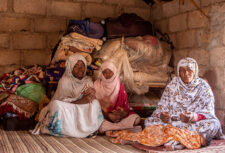Disclaimer: This article is more than 16 years old, and may not include the most up-to-date information or statistics. Please verify information with more recent sources as needed, and if you have any questions contact our Press Office.
3 April 2008


In a historic first, a former slave is bringing a case against the State of Niger before the Economic Community of West African States (ECOWAS) Community Court of Justice in Niamey on 7 April 2008, on the grounds that Niger has failed to implement laws against slavery.
Despite the criminalisation of slavery in 2003, the Government of Niger is accused of not only failing to protect Hadijatou Mani from the practise of slavery, but also continuing to legitimise this practise through its customary law, which is discriminatory towards women and in direct conflict with its own criminal code and constitution.
Hadijatou was sold into slavery when she was 12 years old. She was purchased for £250 and carried out domestic and agricultural work. She also lived as a sexual slave or sadaka to her master, who already had four wives and seven other sadaka. Hadijatou served her master and his family for 10 years. She was never paid for her work and lived in a state of complete submission to her master, being subjected to regular beatings and sexual violence. Her circumstances fall squarely within the longstanding internationally accepted definition of slavery as: “The status or condition of a person over whom any or all of the powers attaching to the right of ownership are exercised” (UN Slavery Convention 1926).
In 2005, her master released her – providing a ‘liberation’ certificate – with the intention of legalising his ‘relationship’ with her. But when Hadijatou decided to take her newfound freedom and leave, he refused to let her go, arguing that she was in fact his wife. She appealed to a local tribunal which found that there had been no marriage between them, and that therefore she was free. Hadijatou then married a man she had freely chosen but her former master brought a complaint against her for bigamy. In a retrial, the judge ruled in the master’s favour and she was sentenced to six months imprisonment.
Local lawyers are being assisted by the International Centre for Legal Protection of Human Rights (INTERIGHTS), with support from Anti-Slavery International and Timidria. Hadijatou is seeking redress from the ECOWAS Court of Justice on the grounds that Niger has violated its obligations under the African Charter of Human and Peoples’ Rights, the International Covenant of Civil and Political Rights, the Convention for the Elimination of All Forms of Discrimination Against Women, the African Charter on the Rights and Welfare of the Child, the Slavery Convention and the Supplementary Convention on the Abolition of Slavery, the Slave Trade, and Institutions and Practices Similar to Slavery, all of which Niger has ratified, and domestic law.
At least 43,000 people are in slavery across Niger. They are born into an established slave class and are made to do all labour required by their masters without pay, including herding and cleaning. Slaves are inherited, given as gifts and can have their children taken away from their mothers at an early age. They are denied all rights and choice.
A positive ruling in this case would set a legal precedent with respect to protection from slavery and, as ECOWAS Court decisions are applicable to all its Member States, the outcome could have a wide-ranging impact on slavery and human rights issues beyond Niger. Such a ruling would send a message that the long-standing legal prohibition on slavery must be translated into practice and would clarify the practical nature of States’ obligations to eradicate slavery.





